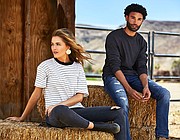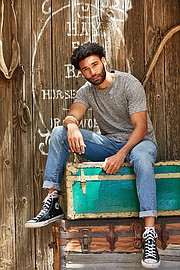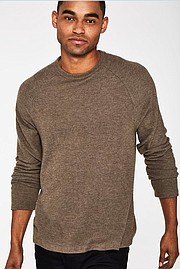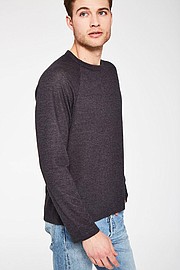MANUFACTURING
Project Social T: Looking for a Difference
In the early days, Project Social T made its reputation with women’s T-shirts, but now, in search of new business, the Los Angeles–headquartered label is introducing a line of men’s tees.
Mike Chodler, the company’s founder and chief executive officer, said he jumped into the men’s market because the industry expects it. Retailers are always looking for brands with dual-gender lines, and Chodler and his team wanted to flex their creative muscle.
It’s a crucial move in the basics business. Fred Levine, co-founder of the M.Fredric boutiques, said the basics business is lucrative but crowded. “It’s always in style, especially now that layering is so popular,” he said, adding that he recommends basics brands develop “must-have” fashion lines to complement their high-end crew-neck and V-neck shirts.
Project Social T started out in 2014 as a juniors label selling tops to the major department stores. In 2016, it changed gears and started making women’s contemporary tops. While it continues to work with the majors, its retail focus also changed to supplying independent boutiques.
Chodler forecasted that the company’s boutique revenue will grow 55 percent over the label’s 2017 revenue. “With boutiques you have more creative control,” the CEO said. “You’re driving what you believe the fashion should be.”
Making a unique tee is serious business. Chodler employs a staff of three full-time designers who research and develop new fabrics.
The women’s tops business has taken the privately held Project Social T a long way. The brand has grown from a staff of 10 in 2014 to a work force of 50. A few years ago, its operations were run from a 5,000-square-foot space. Now its headquarters in Boyle Heights encompasses three warehouses that stretch out over 30,000 square feet.
For the women’s line, Project Social T starts with a loose-fitting V-neck top. For guys, the standard shapes are crew necks and V-necks that sell from $48 to $118.
The silhouettes are the foundation for any basics line. However, the competitive edge is in the details. Change the fabric of a T-shirt, the market gets something new.
“The tee has become synonymous with jersey fabrics,” Chodler said. But try a new brushed fabric and the average T-shirt can feel like cashmere.”
Basic T-shirts currently in vogue feel soft and have a vintage look. “We’re trying to develop and change yarns to give different looks by mixing new yarns together. We’re creating new fabrics. We’re also working with stripes and knits,” he said.
Popular looks for Project Social T’s new men’s line include the Baker raglan hoodie, which Chodler describes as being made out of a soft, brushed Hacci fabric. Hacci is a loose sweater knit more loopy than a typical cotton fabric.
Another popular look is the Sequoia hoodie. The fabric is made of a lightweight Japanese slub fabric, which makes it look like a T-shirt shaped into a hoodie silhouette.
The great majority of Project Social T’s goods are made without graphics, but they feature hangtags that list details of nonprofits the company supports, such as Waymakers, a Huntington Beach, Calif., group that provides shelter and services to the homeless and at-risk youth.
Supporting charity and maintaining a social consciousness are a big part of the brand’s mission and was the inspiration for the brand’s name.
Also, supporting nonprofits appeals to the brand’s consumers and makes for a better clothing line. “I think it resonates in the product and underscores a very compelling story,” Chodler said. “Compassion and consumerism are harmoniously working together for the better—a better world, a better life. I believe that it gives the product a soul, and that is something to be proud of.”

























